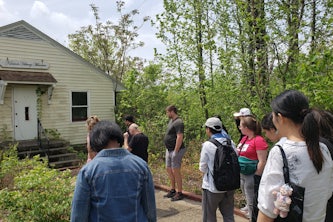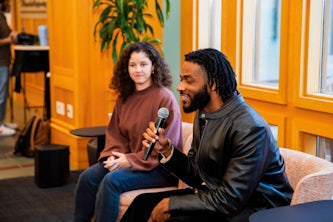BME senior design demos go virtual
While the 2020 BME Day was canceled, students still had the opportunity to present their innovations to an audience

Each year, seniors in the Department of Biomedical Engineering demonstrate their ingenuity and engineering competency by taking BME 401: Senior Design. The yearlong class challenges students to design and manufacture a solution for a pressing biomedical problem.
Traditionally, the class culminates with the celebration of BME Day, an annual spring event where senior students present their innovations to the public. And while the semester was interrupted and the 2020 BME Day canceled to comply with social distancing measures, the teams still had the opportunity to impress professors and judges with their novel solutions.
"Working remotely 'together' is tough, but the students did a great job," said Joe Klaesner, associate professor of biomedical engineering and instructor of the senior design course. "We realized many of the groups wouldn't be able to complete their projects because they were in labs throughout campus, so we had them complete what they could, such as the mechanical and electrical designs and the software."
Instead of taking part in face-to-face presentations on campus, teams produced videos demonstrating their projects that were judged by business and engineering leaders.
"The one positive was that the virtual design competition allowed for individuals around the world to judge the projects," said Klaesner, also a professor of physical therapy at the School of Medicine. "The furthest judge participating was in Korea."
The winning project, titled "Detection of Post-Operative Infection and Edema," was designed by Adler, Gaby Altman and Anisha Shah, and features a wearable device designed to detect post-operative infection in patients.
"The device helps nurses and physicians stay informed in real-time about a patient's recovery after surgery," Shah said. "Not only would this cut down the amount of time that hospital staff spend checking patients' vitals, but it allows them to keep track of recovery after a patient is discharged."
While team members say they were excited by their win, it came with major challenges.
"Our group had a lot of limitations for completing the design process remotely," Altman said. "Even if we were together and had the prototype, we would not have access to a lot of important materials and machines we needed for the design process."
"Although we had begun prototyping before the switch to remote learning, not being able to meet in person meant we could not finish our project in the same way we had planned," Shah said. "We would have loved to continue building our design in person together, but we did the best we could over Zoom and Facetime."
Still, Klaesner said the competition was a success.
"We were all pretty shocked that we have won first place," Adler said. "We all knew we had a strong report and video but our classmates also came up with some amazing devices."
"The senior design class was a great group that navigated a difficult situation with class, hard work and persistence.



